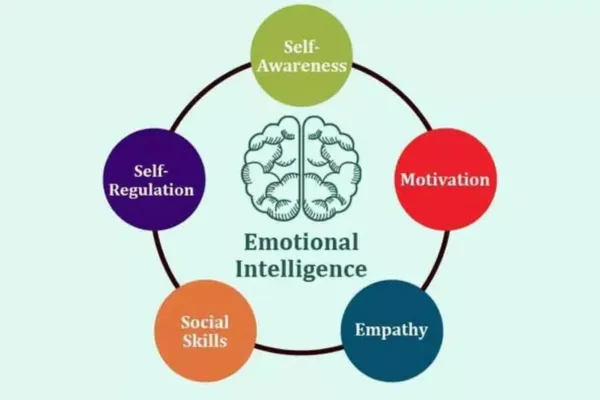Blog
A tailored shift program for driven entrepreneur women.
Move from burnout to clarity, create a sustainable legacy, and excel in leadership without any guilt.

Emotional Intelligence in Leadership: A Modern Guide for 2025
“Why Emotionally Intelligent Leaders Will Own 2025: What You Need to Know.” - Seth Godin
Introduction:
In the rapidly changing workplace of 2025, leadership is no longer just about strategy and execution. It’s about people. Leaders who excel are those who are emotionally intelligent and understand the human side of leadership. Emotional intelligence in leadership is a crucial skill that impacts everything from team morale to overall business success. In this blog, we will explore why emotional intelligence is vital for leadership effectiveness and provide actionable strategies for developing EI in leadership roles.
What Is Emotional Intelligence in Leadership?
Emotional intelligence in leadership refers to a leader’s ability to recognize, understand, and manage emotions—both their own and others’. It’s not only about being “nice” or “sensitive.” It’s about staying calm under pressure, resolving conflicts fairly, and building trust.
The Five Core Components Explained
Self-awareness – Knowing your emotional triggers and how they impact decisions.
Self-regulation – Controlling impulsive behaviors and staying composed.
Motivation – Using passion to drive results rather than pressure.
Empathy – Understanding team members’ feelings and responding appropriately.
Social skills – Managing relationships, resolving disputes, and building strong teams.
These pillars create a foundation for strong, human-centered leadership.
Why Traditional Leadership Models Fall Short in 2025
The business world is evolving at an unprecedented rate. With the rise of remote work, a more diverse workforce, and a faster-paced environment, traditional leadership models no longer suffice. Leaders must go beyond managing tasks and instead focus on understanding the emotions and motivations of their teams.
Changing Workforce Dynamics
In 2025, organizations are moving away from traditional top-down leadership. A shift towards more collaborative, flexible, and employee-focused structures is taking place. This transition demands leaders who can adapt to different emotional climates within their teams.
The Role of Emotional Intelligence in Leadership
Emotional intelligence in leadership is the ability to understand and manage your own emotions, as well as recognize and influence the emotions of others. Leaders with high emotional intelligence can foster stronger relationships, communicate more effectively, and create more supportive work environments. Without this key trait, traditional leaders risk alienating their teams and losing valuable talent.
What Happens When Emotional Intelligence is Missing from Leadership?
When leaders lack emotional intelligence, the results can be disastrous. Leaders who fail to engage emotionally with their teams can create toxic work environments where stress and disengagement are rampant.
The Emotional Cost of Poor Leadership
Without emotional intelligence, leaders may struggle with conflict resolution, giving feedback, and building trust within their teams. This can lead to:
High turnover rates
Increased workplace stress
A lack of team cohesion
Low job satisfaction
The Business Consequences
When emotional intelligence is absent, productivity and performance are negatively impacted. Research shows that emotionally intelligent leadership directly correlates with improved employee engagement, which in turn leads to higher profits and better customer satisfaction. Leaders who fail to develop emotional intelligence may find themselves battling declining team morale and a lack of motivation across the company.
How to Develop Emotional Intelligence as a Leader in 2025
While emotional intelligence in leadership is critical, the good news is that it can be developed over time. Here are some practical steps on how to develop emotional intelligence as a leader:
1. Build Self-Awareness
The foundation of emotional intelligence is self-awareness. Leaders must recognize their emotions and how they affect their thoughts and behavior. Self-awareness allows leaders to control their reactions and respond to situations in a calm and thoughtful manner.
Action Step: Start journaling to reflect on your daily emotional experiences and how they impact your leadership decisions.
2. Practice Self-Regulation
Leaders must be able to manage their emotions effectively, particularly in high-pressure situations. Self-regulation involves staying in control of your emotions, avoiding impulsive decisions, and handling stress with grace.
Action Step: Practice mindfulness or breathing exercises to reduce stress and improve emotional control during challenging moments.
3. Cultivate Empathy
Empathy is the ability to understand and share the feelings of others. Great leaders are empathetic, making their team members feel understood and valued. Empathy leads to stronger interpersonal connections and a more inclusive work environment.
Action Step: Engage in active listening during conversations and make an effort to understand team members’ perspectives.
4. Improve Social Skills
Leaders need excellent social skills to communicate effectively, resolve conflicts, and build strong relationships with their teams. Leaders with strong social skills inspire trust and collaboration.
Action Step: Focus on developing open communication with your team, encouraging honest feedback, and practicing conflict resolution strategies.
5. Increase Motivation
Emotional intelligence involves a high level of self-motivation. A motivated leader can inspire and engage their team, pushing them towards shared goals and a collective vision.
Action Step: Set personal and professional goals that are aligned with the team's objectives. Share your passion and vision with the team to inspire motivation.
The Impact of Emotional Intelligence on Leadership Effectiveness
Leaders who invest in developing their emotional intelligence see significant improvements in leadership effectiveness. Emotional intelligence helps leaders navigate complex interpersonal dynamics and drive business success.
Stronger Team Relationships
Leaders with emotional intelligence can build trust and respect within their teams. This leads to better collaboration, improved communication, and a more supportive work environment.
Higher Employee Engagement
When leaders understand and connect with their employees on an emotional level, they can boost engagement and motivation. Engaged employees are more productive, committed, and likely to stay with the company.
Better Decision-Making
Emotional intelligence enables leaders to make decisions that are not only logical but also empathetic. These decisions take into account the emotional impact on employees, customers, and other stakeholders.
Increased Innovation
Emotionally intelligent leaders foster a culture of psychological safety, where employees feel comfortable sharing ideas and taking risks. This leads to more innovation and creativity within the organization.
Emotional Intelligence and Leadership Training: A Necessity in 2025
As the workplace continues to evolve, leadership training must incorporate emotional intelligence to be truly effective. Emotional intelligence and leadership training should be a key component of leadership development programs.
Why Leadership Training Needs to Focus on Emotional Intelligence
Leadership training that includes emotional intelligence helps leaders develop the skills necessary for managing diverse teams, resolving conflicts, and maintaining positive workplace cultures. Leaders who undergo emotional intelligence training are more likely to create work environments that foster creativity, trust, and collaboration.
Top Training Programs for Leaders.
Several programs focus specifically on developing emotional intelligence in leadership:
EI for Leadership Program: Focuses on improving self-awareness, self-regulation, and empathy.
Emotional Intelligence Certification: A more in-depth program designed to teach leaders how to apply EI in real-world business settings.
By incorporating emotional intelligence into leadership training, businesses can ensure their leaders are prepared for the challenges of 2025 and beyond.
Conclusion
As we move further into 2025, emotional intelligence will become even more critical in leadership. Leaders who develop their emotional intelligence are better equipped to manage teams, handle conflict, and drive business success. Emotional intelligence is no longer just a nice-to-have—it’s a must-have. Whether you’re a new manager or an experienced executive, prioritizing emotional intelligence in leadership will lead to more effective decision-making, stronger teams, and better outcomes for your business.
Frequently Asked Questions (FAQs)
1. What is emotional intelligence in leadership?
Emotional intelligence in leadership refers to a leader's ability to understand and manage their own emotions, as well as recognize and influence the emotions of others. It’s key to building strong relationships and making effective decisions.
2. How can I develop emotional intelligence as a leader?
You can develop emotional intelligence by practicing self-awareness, self-regulation, empathy, social skills, and motivation. Tools like mindfulness, active listening, and emotional intelligence training can help improve these skills.
3. How does emotional intelligence affect leadership effectiveness?
Leaders with high emotional intelligence are more effective because they foster trust, improve communication, boost employee engagement, and create a positive work culture, all of which contribute to business success.
4. Is emotional intelligence important for team performance?
Yes, emotional intelligence plays a crucial role in team performance. Leaders who are emotionally intelligent create supportive environments where employees feel valued and motivated, leading to better teamwork and productivity.
5. Can emotional intelligence be learned or is it an innate trait?
While some people may naturally possess higher emotional intelligence, it is a skill that can be developed over time. With practice and training, leaders can significantly improve their emotional intelligence and its impact on leadership.
Ignite Your Legacy
A tailored shift program for driven entrepreneur women.
Move from burnout to clarity, create a sustainable legacy, and excel in leadership without any guilt.
